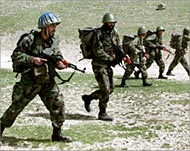Iraq may follow Afghan route
“They’ve left a mess in both these countries and they’re not finished. Now they are turning their attention to a third country,” says the Syrian Foreign Minister.

Afghanistan and Iraq have suffered similar experiences in recent years. Both have had there governments changed by force, both have US military bases inside their borders, both will rely on the US for the foreseeable future.
 |
|
Afghan soldiers on the
|
Naturally there are points of dissimilarity. In Afghanistan, the military is splintered by factionalism, the police force is untrained, the justice system is dominated by religious conservatives who have more in common with the Taliban than with Karzai, and tax collection is largely ineffective. Iraq, on the other hand, has had years of experience under a secular government that ruled with a rod of iron.
The bodies of two US soldiers are carried onto a military plane during a ceremony in Kandahar March 30, 2003. The US special forces soldiers were killed in an ambush near the town of Geresk in Helmand province in southern Afghanistan
In Afghanistan, the US no longer talks exclusively about new schools, roads and services for needy people, if it mentions reconstruction at all. The administration talks about establishing functioning government agencies and about slowly spreading the authority of the central government beyond Kabul. It is here that comparisons begin, despite the fact that the US allowed an Afghan to lead an interim government in Kabul, but would not extend the same courtesy to Iraq.
Similar meetings
The mid-April US-sponsored meetings with Iraqi opposition leaders in Nasiriya were similar to those held in December 2002 in London, where hundreds of officials, security guards and journalists attended a gathering of US recognized Iraqi opposition groups.
The meetings are also reminiscent of those held in Germany in 2002 to forge an interim government in Afghanistan following the US invasion and removal of the Taliban government, but the comparisons don’t end there.
The US pledged to stand by Afghanistan as it rebuilds itself, just as it now pledges to help Iraqis rebuild their country. Dr. Hamidzada, a research fellow at the Centre of International Cooperation, says that countries now talk about fulfilling their pledges for donations rather than their promises to rebuild a country.
Repairing and policing Iraqi oilfields before policing cities, however, does not bode well for sincere nation building.
Zalmay Khalilzad, Bush’s special envoy to “free Iraqis” was also the special envoy to “free Afghanis” in 2002. He was instrumental in having Karzai elected, maybe he will be instrumental in having Chalabi elected later this year, should the Administration back the Pentagon’s favourite.
Karzai was virtually unknown in Afghanistan, just as Ahmed Chalabi is virtually unknown in Iraq. Both leaders may attain power when their predecessors have disappeared, Saddam Hussein has become as elusive as Osama Bin Ladin and Mullah Omar.
Afghanistan has ethnic, religious and tribal groupings that have so far prevented the formulation of any national government. Political differences continue to be manipulated by neighbouring countries and fighting continues to break out, even increasing in frequency since the beginning of the third Gulf War.
Factional infighting
With the assassination of a leading Shia cleric, and historic grievances between Kurds and Iraqi Arabs, as well as Shias and Sunnis, in addition to Turkish insistence that Kurds should not have an autonomous region, Iraq may well prove a melting point of factional in-fighting in the weeks ahead.
Talking about the Bush administration’s military actions in Afghanistan and Iraq, Syrian Foreign Minister Farouk Sharaa questioned the United States’ motive.
“Look at all these things: Is Afghanistan stable? Have their objectives been achieved? Have they found Osama bin Laden?” he asked, before mentioning the “looting and lawlessness” that followed the fall of Saddam’s regime.
“They’ve left a mess in both these countries and they’re not finished. Now they are turning their attention to a third country,” he said.
With pressure now growing on Syria, one may wonder whether the whole interim government selection meeting process will begin again next year in Damascus or Aleppo.